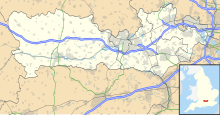Catmore and Winterly Copses
Appearance
| Site of Special Scientific Interest | |
 Catmore Copse | |
| Location | Berkshire |
|---|---|
| Grid reference | SU 375 659[1] |
| Coordinates | 51°23′28″N 1°27′43″W / 51.391°N 1.462°W |
| Interest | Biological |
| Area | 25.0 hectares (62 acres)[1] |
| Notification | 1984[1] |
| Location map | Magic Map |
Catmore and Winterly Copses is a 25-hectare (62-acre) biological Site of Special Scientific Interest north-west of Kintbury in Berkshire.[1][2]
The woods are broadleaved, mixed and yew woodland located in a lowland area.[3]
The site is private land but a public footpath runs through Catmore Copse.
Flora
[edit]The site has the following Flora:[4]
Trees
[edit]- Birch
- Fraxinus
- Maple
- Quercus robur
- Hazel
- Alder
- Aspen
- Prunus avium
- sallow
- Malus
- Frangula alnus
- Viburnum opulus
- Prunus spinosa
Plants
[edit]- Carex pallescens
- Geum rivale
- Lathyrus montanus
- Melampyrum pratense
- Valeriana dioica
- Platanthera chlorantha
- Lysimachia nummularia
- Scutellaria galericulata
- Filipendula ulmaria
- Veronica beccabunga
- Polygonum hydropiper
- Rubus fruticosus
- Pteridium aquilinum
- Deschampsia cespitosa
- Mercurialis perennis
- Lamiastrum galeobdolon
- Adoxa moschatellina
- Ajuga reptans
- Oxalis acetosella
- Primula vulgaris
- Luzula pilosa
- Lysimachia nemorum
- Dryopteris dilatata
- Dryopteris felix-mas
- Athyrium filix-femina
- Blechnum spicant
- Carex acutiformis
References
[edit]Wikimedia Commons has media related to Catmore and Winterly Copses.
- ^ a b c d "Designated Sites View: Catmore and Winterly Copses". Sites of Special Scientific Interest. Natural England. Retrieved 2 March 2020.
- ^ "Map of Catmore and Winterly Copses". Sites of Special Scientific Interest. Natural England. Retrieved 2 March 2020.
- ^ "Condition of SSSI Units for Site Catmore and Winterly Copses SSSI". Natural England. Retrieved 6 March 2017.
- ^ "SITE NAME: CATMORE AND WINTERLY COPSES" (PDF). Archived from the original (PDF) on 30 March 2014. Retrieved 6 March 2017.

